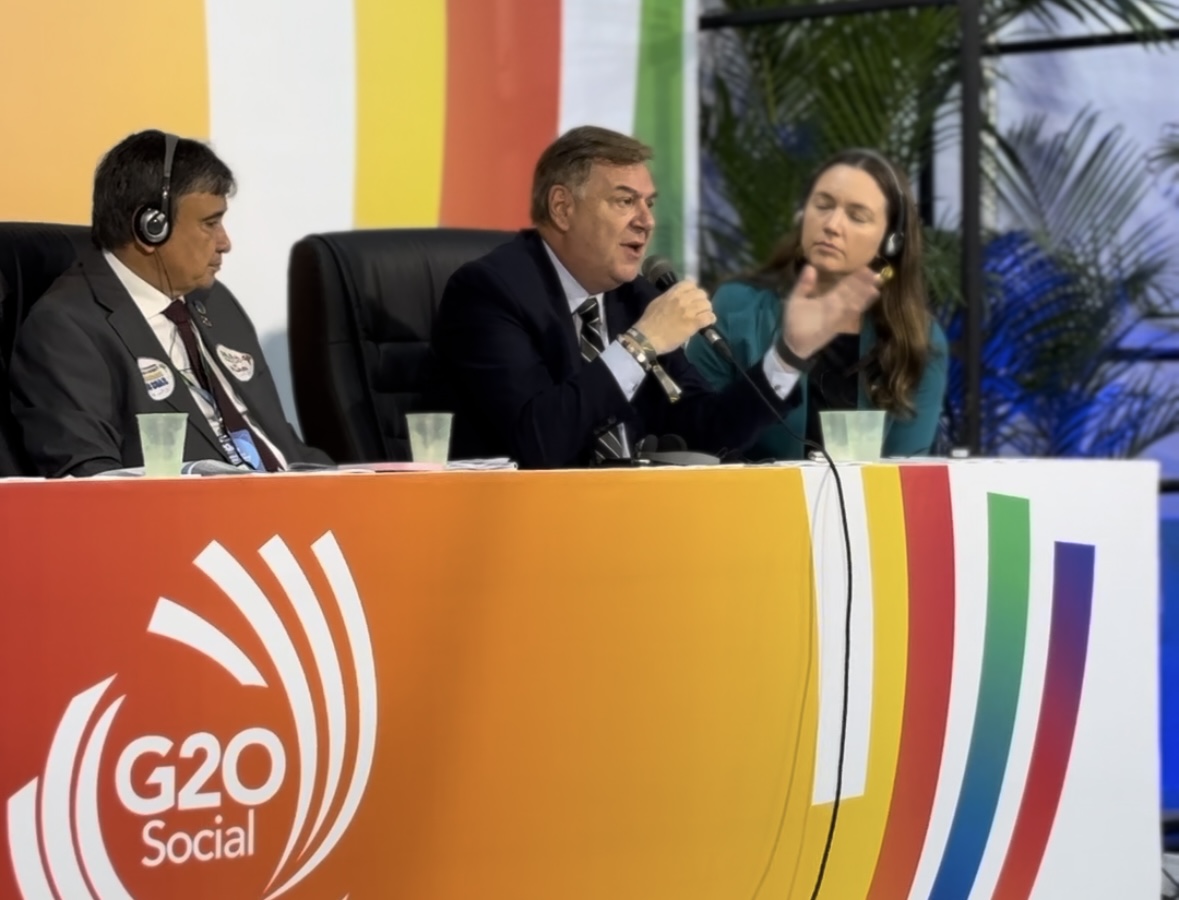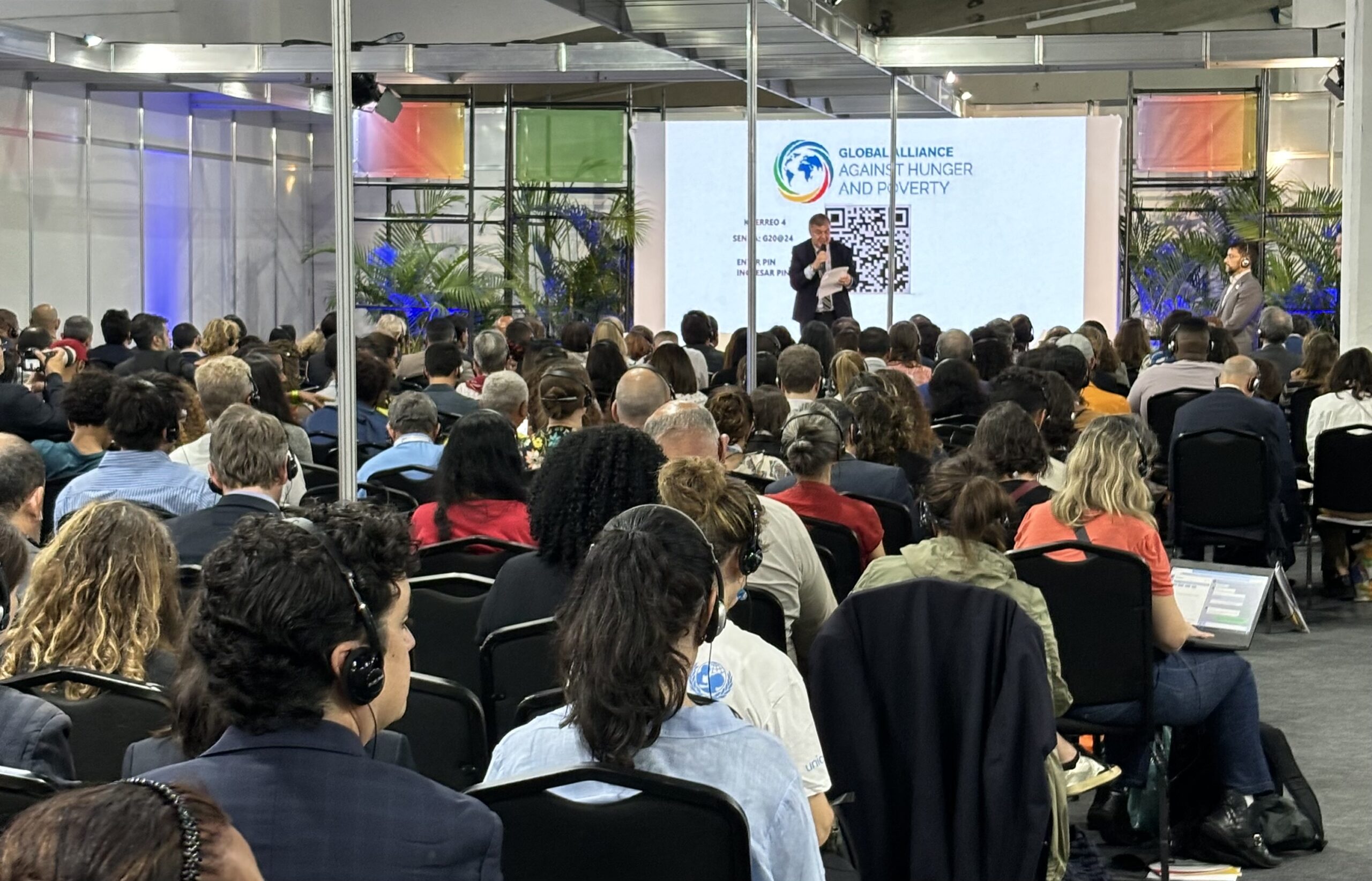
The World Food Programme (WFP) Centre of Excellence against Hunger in Brazil was present at the G20 Social, held from November 14 to 16 in Rio de Janeiro. At the invitation of Wellington Dias, Minister of Social Development and Fight against Hunger, the director of the Centre of Excellence, Daniel Balaban, represented the United Nations agencies at a press conference on the Global Alliance against Hunger and Poverty.
“We at the United Nations are very pleased with the launch, within the G20, of the Global Alliance against Hunger and Poverty. This is an opportunity for us to solve this problem, with the historic involvement of all the countries and various organizations that have already joined,” said Balaban.
For Minister Wellington Dias, this moment culminates a dialog that began a year ago. “We see that the Alliance has come to mark each country’s commitment to meeting Sustainable Development Goals 1 and 2. This is the moment when countries once again prioritize policies to eradicate poverty and hunger by 2030,” he said.
South Africa’s Ambassador to the United Nations Agencies in Rome, Nosipho Nausca-Jean Jezile, who is also Chair of the UN Committee on World Food Security, said that the basket of policies presented enables shared access to knowledge. “This accelerates the implementation of food security policies,” she said. South Africa will hold the presidency of the G20 from 2025. “We are committed to continuing this movement to eradicate hunger and poverty in the world.”
Social inclusion programs give hope back to the most vulnerable. This is the opinion of Heidi McAnnally-Linz, global representative of the Policy and Partnerships area of BRAC, which brings together initiatives to tackle extreme poverty. “We have included six key policies in the policy basket, and we know how to make them work. We want to collaborate with concrete actions,” he said.
The Global Alliance presented a basket of policies structured around three axes: political viability, knowledge sharing and financial viability. In all, 82 countries have already joined the Global Alliance and announced concrete measures in their national programs.
In addition, 66 organizations from different fields of knowledge have made their research and best practices available for common use, including 24 international organizations and 31 foundations and NGOs.
In the third axis, financial institutions such as the IADB and the World Bank and 7 other international banks are participating financially in implementation. A plan has been structured indicating the participation of each country with its targets and actions, with budgets and donors already defined.

Sprints
Six thematic axes were addressed during meetings called Sprints 2030, an event in which governments, civil society organizations, international organizations and financial institutions presented their support for actions to combat hunger and poverty.
The proposed objectives are: to reach 500 million people with cash transfer programs and social protection systems in low- and lower-middle-income countries by 2030; to expand quality school meals to an additional 150 million children in countries with endemic child hunger and poverty; maternal health and early childhood initiatives will aim to reach 200 million women and children aged 0 to 6; and socio-economic inclusion programs aim to reach an additional 100 million people, with a focus on women.
Daniel Balaban led the Sprint on school feeding. “The school feeding program is one of the proven ways to fight hunger. In this space, countries commit to extending their programs to more children or to creating their own national programs, which is already a very important step,” he said.
Other topics presented at the Sprints were: Cash Transfer Programs; Maternal and Early Childhood Interventions; Socioeconomic Inclusion Programs; Support Programs for Small Farmers and Family Farming; Water Access Solutions for Vulnerable Communities.
Policy in Focus
During the Sprints, the special issue of Policy in Focus was launched, an initiative of the International Policy Center for Inclusive Development of the Institute for Applied Economic Research, in partnership with the WFP and with the support of the socialprotection.org platform, which is now part of the United Nations Research Institute for Social Development.
This special issue of Policy in Focus highlights the urgent need to build complementarities within national social protection systems to achieve greater food and nutrition security. The magazine can be accessed in Policy in Focus.




